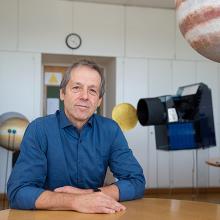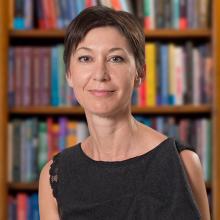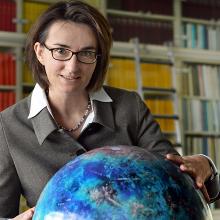
Willy Benz studied physics in Switzerland at the Universities of Neuchâtel and Geneva. He then went on to post-doctoral work at Los Alamos National Laboratory (USA) and at Harvard University (USA), where he was appointed assistant and subsequently associate professor. In 1991, he joined the faculty at the University of Arizona in Tucson (USA) as a full professor.
In 1997, he returned to Switzerland as a professor at the Physics Institute at the University of Bern, where he was the director between 2002 and 2015. Currently, he is the Director of the Swiss National Center “PlanetS” dedicated to studying the formation, evolution, and characterization of planets. He is also the Principal Investigator of CHEOPS, the first small mission in ESA’s scientific programme launched in December 2019. Since 2007 he is an external scientific member of the Max Planck Society in Germany.
He has served on many national and international committees. He chaired The European Space Agency (ESA) Space Science Advisory Committee and the European Southern Observatory (ESO) Science and Technical Committee. In 2018, he was elected president of the ESO Council.

Professor Giovanna Tinetti is Head of the Astrophysics Group, UCL Department of Physics & Astronomy, and Director of the UCL Centre for Space Exochemistry Data at Harwell.
She is the Principal Investigator of Ariel, the European Space Agency's next medium-class (M4) science mission to be launched in 2028. She is also co-founder and co-director of Blue Skies Space Ltd, which aims at creating new opportunities for science space satellites.
Select appointments and achievements include Principal Investigator of the European Research Council-funded program Exo-Lights (2014-2019), and Institute of Physics Moseley medal 2011.
Awarded a PhD in Theoretical Physics from the University of Turin in Italy, Giovanna Tinetti has continued her academic career as NASA Astrobiology Institute fellow at Caltech/JPL and then as European Space Agency external fellow in Paris, before moving to UCL in 2007 as STFC Aurora and then Royal Society URF Fellow.
Prof. Tinetti has authored / co-authored over 180 research papers and has delivered over 260 talks, seminars and public lectures internationally.

Professor Heike Rauer is director of the Institute of Planetary Research of the German Aerospace Center (DLR) and professor for planetology at the Free University of Berlin.
She earned her degree in Physics from the University of Hannover in 1986 and completed a doctorate at the University of Göttingen in 1991 with research work on cometary plasma tails performed at the Max Planck Institute for Aeronomy. Awarded a research fellowship by the European Space Agency (ESA), she worked at the Observatoire de Paris – Meudon from 1995 to 1997. During her subsequent period at DLR, Heike Rauer completed her post-doctoral qualification (Habilitation) at the Technical University of Berlin in 2004, where she became a professor for Planetary Physics at the Department of Astronomy and Astrophysics, in parallel to heading the department of Extrasolar Planets and Atmospheres at the DLR Planetary Research Institute. She moved to the Department of Geosciences at the Free University of Berlin in November 2017, where she specialised in planetology, in conjunction with the new position as director of the DLR Institute of Planetary Research.
She was member of the science council of the French-European mission CoRoT, the first mission dedicated to the search for extrasolar planets. Since 2013, Rauer has been PI of the instrument consortium for the ESA space telescope PLATO, which will survey the Milky Way for planets, in particular Earth-like planets, from 2026. She is Co-PI of the Next Generation Transit Survey (NGTS), a network of 12 automatically operating telescopes that search for exoplanets at Paranal Observatory, which is part of the European Southern Observatory (ESO) in Chile. She coordinates a German-wide research network on the diversity of extrasolar planets (DFG SPP 1992) since 2018.
